- Online car rental since 2005
- Popular countries
- Popular regions
- Popular cities
- Popular airports
- Car Rental Italy
- Car Rental Spain
- Car Rental United States
- Car Rental Portugal
- Car Rental South Africa
- Car Rental France
- Car Rental Netherlands
- Car Rental Germany
- Car Rental United Kingdom
- Car Rental Greece
- Car Rental Austria
- Car Rental Switzerland
- Car Rental Croatia
- Car Rental Belgium
- Car Rental Norway
- Car Rental Ireland
- Car Rental Denmark
- Car Rental Australia
- Car Rental Canada
- Car Rental Sweden
- Car Rental Florida
- Car Rental England
- Car Rental California
- Car Rental Sicily
- Car Rental Mallorca
- Car Rental Tenerife
- Car Rental Sardinia
- Car Rental Ibiza
- Car Rental Madeira
- Car Rental Crete
- Car Rental Gran Canaria
- Car Rental Scotland
- Car Rental Azores
- Car Rental Malta
- Car Rental Corsica
- Car Rental Lanzarote
- Car Rental Fuerteventura
- Car Rental Rhodes
- Car Rental Corfu
- Car Rental La Palma
- Car Rental Amsterdam
- Car Rental Milan
- Car Rental Miami
- Car Rental Lisbon
- Car Rental Malaga
- Car Rental Porto
- Car Rental Cape Town
- Car Rental Rome
- Car Rental Alicante
- Car Rental Bergamo
- Car Rental Barcelona
- Car Rental London
- Car Rental Faro
- Car Rental Orlando
- Car Rental Munich
- Car Rental Vienna
- Car Rental Nice
- Car Rental Johannesburg
- Car Rental Bari
- Car Rental Madrid
- Car Rental Amsterdam Schiphol Airport
- Car Rental Miami International Airport
- Car Rental Lisbon Airport
- Car Rental Malaga Airport
- Car Rental Porto Airport
- Car Rental Milan Malpensa Airport
- Car Rental Alicante Airport
- Car Rental Rome Fiumicino Airport
- Car Rental Bergamo Airport
- Car Rental Faro Airport
- Car Rental Cape Town Airport - International Terminal
- Car Rental Orlando International Airport
- Car Rental Barcelona Airport
- Car Rental Vienna Airport
- Car Rental Munich Airport
- Car Rental Mallorca Airport
- Car Rental Bari Palese Airport
- Car Rental Nice Airport
- Car Rental Bologna Airport
- Car Rental Los Angeles International Airport

Car Rental Portugal
Save time and money. We compare the offers of car rental companies in Portugal on your behalf.
- Free cancellation Up to 48 hours prior to the scheduled pick-up time
- Best price guarantee Have you found a better price? Let us know and we will make you a better offer.
- 24000+ pick-up locations Locations around the world

Car Rental Portugal
EasyTerra Car Rental Portugal is an independent car rental comparison site. Our site compares prices from well-known car rental companies so that, as a customer, you can always reserve your car with us at a competitive rate.
Car rental offers in Portugal
Whether you're looking for a small rental car or a station wagon for the entire family, we will always have a suitable vehicle at the lowest price. Below are some examples from our selection in Portugal.

-
Klass Wagen From€ 1 /day -
Europcar From€ 12 /day -
Autatlantis From€ 14 /day

-
Klass Wagen From€ 1 /day -
Green Motion From€ 2 /day -
Tangerine From€ 2 /day

-
Goldcar From€ 4 /day -
Goldcar Key'n Go From€ 20 /day

-
Klass Wagen From€ 2 /day -
SurPrice car rentals From€ 3 /day -
wheego From€ 4 /day

-
FireFly Car Rental From€ 2 /day -
wheego From€ 2 /day -
SurPrice car rentals From€ 3 /day

-
Tangerine From€ 4 /day -
OK Mobility From€ 4 /day -
Goldcar From€ 4 /day

-
FireFly Car Rental From€ 2 /day -
Autounion Car Rental From€ 7 /day -
Flizzr From€ 7 /day

-
Klass Wagen From€ 2 /day -
Drive On Holidays From€ 6 /day -
Autatlantis From€ 9 /day

-
OK Mobility From€ 6 /day -
Drive On Holidays From€ 6 /day -
Sicily by Car From€ 6 /day

-
Klass Wagen From€ 1 /day -
Record Go From€ 3 /day -
Wayzor From€ 3 /day

-
Klass Wagen From€ 2 /day

-
Goldcar From€ 4 /day -
Centauro From€ 8 /day -
Drive On Holidays From€ 17 /day

-
Tangerine From€ 2 /day -
SurPrice car rentals From€ 3 /day -
Drive On Holidays From€ 6 /day

-
Green Motion From€ 2 /day -
SurPrice car rentals From€ 4 /day -
OK Mobility From€ 5 /day

-
Goldcar From€ 4 /day -
FireFly Car Rental From€ 13 /day -
Green Motion From€ 14 /day

-
Klass Wagen From€ 2 /day -
FireFly Car Rental From€ 3 /day -
OK Mobility From€ 3 /day

-
Green Motion From€ 2 /day -
OK Mobility From€ 3 /day -
Right Cars From€ 5 /day

-
OK Mobility From€ 4 /day -
Thrifty From€ 15 /day

-
Klass Wagen From€ 2 /day -
OK Mobility From€ 5 /day -
SurPrice car rentals From€ 8 /day

-
Klass Wagen From€ 2 /day -
OK Mobility From€ 4 /day -
FireFly Car Rental From€ 5 /day

-
Goldcar From€ 4 /day -
Green Motion From€ 12 /day -
Goldcar Key'n Go From€ 21 /day

-
Klass Wagen From€ 2 /day -
Record Go From€ 5 /day -
wheego From€ 6 /day

-
Klass Wagen From€ 2 /day -
FireFly Car Rental From€ 11 /day -
Dollar Rent a Car From€ 11 /day

-
Goldcar From€ 5 /day -
Goldcar Key'n Go From€ 21 /day

-
Klass Wagen From€ 2 /day -
Alamo From€ 17 /day

-
Klass Wagen From€ 2 /day -
Green Motion From€ 3 /day -
Drivalia From€ 6 /day

-
Goldcar From€ 6 /day -
Centauro From€ 8 /day -
Flizzr From€ 11 /day

-
Klass Wagen From€ 2 /day -
Tangerine From€ 4 /day -
Goldcar From€ 7 /day

-
Klass Wagen From€ 3 /day -
OK Mobility From€ 5 /day -
Ilha Verde Rent a Car From€ 18 /day

-
Centauro From€ 8 /day -
Keddy By Europcar From€ 21 /day -
Dollar Rent a Car From€ 23 /day

-
Klass Wagen From€ 3 /day -
Drivalia From€ 25 /day

-
Tangerine From€ 4 /day -
Green Motion From€ 4 /day -
FireFly Car Rental From€ 12 /day

-
Record Go From€ 10 /day -
Ilha Verde Rent a Car From€ 37 /day -
Sixt From€ 61 /day

-
Tangerine From€ 4 /day -
Green Motion From€ 4 /day

-
Tangerine From€ 4 /day -
Record Go From€ 4 /day -
OK Mobility From€ 5 /day

-
Ilha Verde Rent a Car From€ 11 /day

-
Klass Wagen From€ 4 /day -
Drive On Holidays From€ 25 /day

-
Klass Wagen From€ 5 /day

-
OK Mobility From€ 11 /day -
Dollar Rent a Car From€ 57 /day -
Thrifty From€ 62 /day

-
Klass Wagen From€ 6 /day -
Sixt From€ 26 /day -
Autatlantis From€ 34 /day

-
wheego From€ 6 /day -
OK Mobility From€ 7 /day -
Madeira Rent From€ 32 /day

-
Goldcar From€ 15 /day -
Goldcar Key'n Go From€ 24 /day -
Keddy By Europcar From€ 29 /day

-
OK Mobility From€ 7 /day

-
Goldcar From€ 9 /day -
Keddy By Europcar From€ 27 /day -
Europcar From€ 29 /day

-
Centauro From€ 18 /day

-
Klass Wagen From€ 4 /day

-
Klass Wagen From€ 5 /day -
Record Go From€ 11 /day -
Europcar From€ 39 /day

-
Klass Wagen From€ 13 /day

-
Klass Wagen From€ 5 /day

-
Record Go From€ 16 /day -
Europcar From€ 57 /day

-
Flizzr From€ 17 /day -
Tangerine From€ 25 /day -
Sixt From€ 28 /day

-
Flizzr From€ 17 /day -
Sixt From€ 28 /day -
Ilha Verde Rent a Car From€ 45 /day

-
Drive On Holidays From€ 17 /day

-
Drive On Holidays From€ 25 /day

-
OK Mobility From€ 10 /day

-
OK Mobility From€ 13 /day

-
Record Go From€ 14 /day

-
Record Go From€ 17 /day

-
Klass Wagen From€ 17 /day -
Sicily by Car From€ 127 /day -
Green Motion From€ 405 /day

-
Klass Wagen From€ 17 /day -
Drive On Holidays From€ 18 /day

-
Klass Wagen From€ 22 /day -
Green Motion From€ 454 /day

-
Drive On Holidays From€ 19 /day -
Tangerine From€ 41 /day

-
Drive On Holidays From€ 21 /day

-
Klass Wagen From€ 2 /day -
Drivalia From€ 8 /day

-
Klass Wagen From€ 3 /day -
Guerin From€ 11 /day -
Thrifty From€ 14 /day

-
Goldcar From€ 10 /day -
Record Go From€ 13 /day -
Goldcar Key'n Go From€ 29 /day

-
Green Motion From€ 3 /day -
Drive On Holidays From€ 6 /day -
Bravacar From€ 24 /day

-
Green Motion From€ 3 /day -
OK Mobility From€ 4 /day -
Sicily by Car From€ 8 /day

-
Drive On Holidays From€ 10 /day

-
Klass Wagen From€ 3 /day -
FireFly Car Rental From€ 11 /day

-
Goldcar From€ 4 /day -
Record Go From€ 5 /day -
OK Mobility From€ 12 /day

-
Sicily by Car From€ 11 /day -
Green Motion From€ 14 /day -
Guerin From€ 17 /day

-
Green Motion From€ 11 /day -
Klass Wagen From€ 17 /day -
Guerin From€ 24 /day

-
Flizzr From€ 17 /day -
Klass Wagen From€ 17 /day -
Drive On Holidays From€ 18 /day

-
Flizzr From€ 17 /day -
Sixt From€ 26 /day -
Drive On Holidays From€ 39 /day

-
Tangerine From€ 19 /day -
Drive On Holidays From€ 27 /day -
Europcar From€ 60 /day

-
Klass Wagen From€ 22 /day -
Guerin From€ 27 /day

-
SurPrice car rentals From€ 22 /day

-
Alamo From€ 35 /day -
Enterprise From€ 36 /day -
Guerin From€ 44 /day

-
SurPrice car rentals From€ 23 /day -
Autatlantis From€ 43 /day

-
Tangerine From€ 26 /day -
Budget From€ 54 /day -
Europcar From€ 58 /day

-
Green Motion From€ 2 /day -
Tangerine From€ 2 /day -
Goldcar From€ 2 /day

-
Drive On Holidays From€ 4 /day -
Keddy By Europcar From€ 12 /day -
Europcar From€ 14 /day

-
Goldcar From€ 4 /day -
Drive On Holidays From€ 6 /day -
Sicily by Car From€ 7 /day

-
Drive On Holidays From€ 10 /day -
Keddy By Europcar From€ 18 /day -
Europcar From€ 21 /day

-
Sixt From€ 19 /day -
Autounion Car Rental From€ 28 /day -
CRC car rental company From€ 106 /day

-
Sixt From€ 20 /day

-
Sixt From€ 20 /day -
Autounion Car Rental From€ 28 /day -
Europcar From€ 31 /day

-
Ilha Verde Rent a Car From€ 24 /day

-
Sixt From€ 27 /day -
Europcar From€ 35 /day

-
Klass Wagen From€ 2 /day

-
Goldcar From€ 3 /day -
Green Motion From€ 3 /day -
BeRent From€ 4 /day

-
Goldcar From€ 9 /day -
Drive On Holidays From€ 10 /day -
Flizzr From€ 14 /day

-
Goldcar From€ 3 /day -
CRC car rental company From€ 4 /day -
Drive On Holidays From€ 5 /day

-
Klass Wagen From€ 3 /day -
Sixt From€ 15 /day -
Avis From€ 16 /day

-
Klass Wagen From€ 9 /day

-
Klass Wagen From€ 3 /day -
Tangerine From€ 3 /day -
Cael From€ 9 /day

-
Klass Wagen From€ 3 /day -
Tangerine From€ 5 /day -
Goldcar From€ 7 /day

-
Centauro From€ 10 /day -
Green Motion From€ 12 /day -
Guerin From€ 15 /day

-
Green Motion From€ 2 /day -
Europcar From€ 10 /day -
Cael From€ 16 /day

-
Green Motion From€ 2 /day -
Drive On Holidays From€ 5 /day -
Europcar From€ 11 /day

-
Goldcar From€ 5 /day -
Goldcar Key'n Go From€ 20 /day

-
Goldcar From€ 3 /day

-
Goldcar From€ 3 /day

-
Drive On Holidays From€ 7 /day

-
Green Motion From€ 3 /day -
Drive On Holidays From€ 20 /day

-
Green Motion From€ 3 /day -
Drive On Holidays From€ 6 /day

-
Centauro From€ 8 /day -
Goldcar From€ 17 /day
Popular cities in Portugal

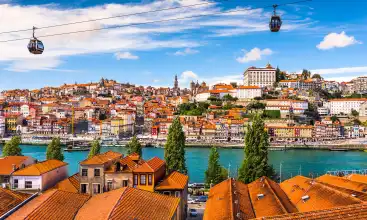
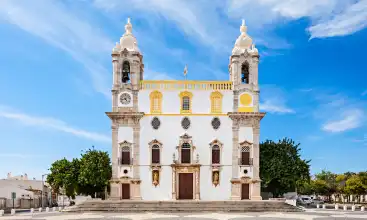
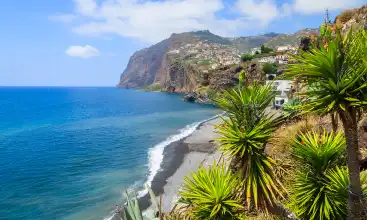
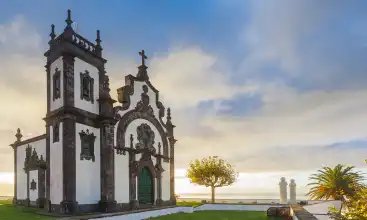
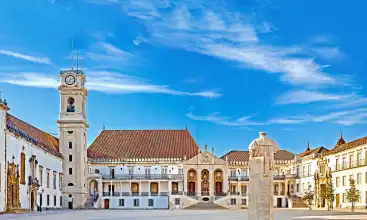
Popular rental locations in Portugal
-
Car Rental Lisbon AirportFrom
€ 1 /day -
Car Rental Porto AirportFrom
€ 1 /day -
Car Rental Faro AirportFrom
€ 1 /day -
Car Rental Funchal Madeira AirportFrom
€ 4 /day -
Car Rental Ponta Delgada AirportFrom
€ 3 /day -
Car Rental Lajes AirportFrom
€ 5 /day -
Car Rental Lisbon Train Station - Gare do OrienteFrom
€ 4 /day -
Car Rental São Bento Train Station
Useful tips for a well-prepared trip
Which insurance should I choose, and what's the deal with the deposit? Read our articles with useful information and tips to ensure you choose the right rental car for you.
Car rental locations in Portugal
EasyTerra Car Rental compares rental car prices at the following destinations

Location information for Portugal
Portugal is best explored by rental car. EasyTerra Car Rental has over 257 pick-up locations in Portugal. This means there is always a pick-up location close to your destination.
Most popular car hire locations in Portugal
Introduction
Portugal is a popular holiday destination. This country in the west of Europe offers beautiful beaches, good accommodations and magnificent nature. Cities like Lisbon and Porto are certainly worth a visit and you can enjoy the delicious Mediterranean kitchen. The sunny climate makes your trip to this country complete.
History
The first inhabitants of what is now Portugal were Celts and Lusitanians. From 200 BC, the country was inhabited by the Romans, who stayed for about 600 years. After a short Germanic domination, the Islamic Moors took control. The Moorish occupation lasted for centuries.
The kingdom of Portugal emerged in the 12th century. Portugal seceded from Galicia and the country was declared independent by the Burgundian knight Henry. When the knight died, he was succeeded by his son Afonso Henriques. This man became the first official king of Portugal. In 1385, John I became king of the country. He managed to prevent neighboring countries from conquering Portugal. Henry the Navigator was the son of John I. He made many voyages of discovery that were very important for the construction of Portugal's global empire.
In the 15th and 16th centuries, Portugal became a major colonial power. At the beginning of the 16th century, Portugal occupied areas in Africa, America and the Middle East. Nevertheless, Philip II of Spain took over control of Portugal in 1580. The Spanish occupation lasted until 1640. The Duke of Bragança organized a coup and assumed the throne as John IV. In 1775, the capital Lisbon was hit by an earthquake that destroyed the city and other parts of the country.
In 1807, Portugal was conquered by Napoleon and his men. With the help of Great Britain Portugal managed to remove the last of the French troops from the country in 1812. Between 1808 and 1821, Rio de Janeiro in Brazil was the capital of Portugal. In 1822, Brazil declared its independence. This returned the position of capital of Portugal to Lisbon.
A century later (1910) the monarchy came to an end. Portugal became a republic, and Teófilo Braga the first president. This period was characterized by political instability. Various governments succeeded each other and no fewer than nine presidents resigned. Shortly after, the First World War started. Economically instable Portugal joined the Allies. During a right wing nationalist revolution in 1926, the republican government was overthrown.
Antonio de Oliveira Salazar was president of Portugal until 1968. His politics were a mixture of Catholic corporatism and fascism. During the Spanish civil war (1936-1939) he supported Franco. During the Second World War, Portugal remained neutral. Later, Portugal was a co-founder of NATO (North-Atlantic Treaty Organisation). Salazar's reign was characterized by colonial wars. Salazar's regime became internationally isolated.
During the 'Carnation Revolution' in 1974, Salazar's right wing leadership was ended. Portugal became a political democracy. Left wing and right wing governments succeeded each other. In 1986, Portugal became a member of the European Union (EU). In the 1990's the country gave its colony Macau back to the Chinese. Since that time, Portugal no longer is a colonial power.
Society and Culture
Portugal has over 10 million inhabitants. The country is sparsely populated and it has a negative population growth. Many Portuguese emigrated in the 1960's. In the 1970's Portugal once more became an attractive place to live, and many people returned. At the moment, many Portuguese (about three million) for economic reasons remain in countries like France, Germany, US, Canada and Venezuela. Five percent of the Portuguese population is made up of immigrants. Most immigrants are from Ukraine, Brazil, Cape Verde and Angola. Also, many people are living illegally in Portugal. A large portion of the population lives in the major cities: Lisbon, Porto, Braga, Aveiro and Coimbra.
About 97% of the Portuguese supports the Roman-Catholic church. In addition, there are Protestants, Muslims, Hindus and Jews. Portuguese is the official language. It is spoken throughout the country (apart from some small villages). It is a Romanic language that resembles the Spanish language. Worldwide, more than 160 million people speak Portuguese.
Architecture is characteristic of Portuguese culture. The country's architecture has been influenced by many cultures with which the country has been in touch (especially the Moorish and Roman cultures). This influence is also visible in the Portuguese festivals, music and literature. Portugal is famous for its Fado. This is the Portuguese music. It is a particular way of singing and it plays an important role in the lives of the Portuguese people. Football is the most popular sport in Portugal. In addition, many other sports are practiced. The Portuguese love their festivals and have them in abundance. The Portuguese people are friendly and they are known as hard workers.
Political Situation
Portugal has a parliamentary democracy. The four pillars of Portuguese politics are the president, the parliament, the government and the (high) courts. The constitution guarantees the separation of powers. The government answers to the president and parliament. The president is elected every five years through universal suffrage. Parliament consists of one chamber with 250 members.
The government is formed by the PS. This is a socialist party. Anibal Cavaco Silva has been the president of Portugal since 2006. He is a member of the PSD; a conservative party. Both the PS and the PSD are market-oriented and in favor of European unification. Since 2005, José Socrates is the prime minister. The prime minister is appointed by the president.
Generally speaking, the Portuguese have a positive attitude towards Europe. Although abortion is currently illegal, it will be discussed again in the near future. Gay rights are improving. Since 1976 women are allowed to vote as well.
Economy
Portugal has a market economy. Membership of the European Union in 1986 has benefited the Portuguese economy. Unemployment has fallen and the country has the fastest growing economy in the European Union. However, Portugal has a negative trade balance and inflation is high. It is the goal of the present government to implement market liberalization and privatization and reduce bureaucracy. This should improve Portugal's competitive position.
The service sector is very important to the Portuguese economy. A part of this is tourism. Every year, 10 to 20 million tourists visit the country. A disadvantage of this is that the economy may come to depend on tourism. The industrial sector also employs a large part of the professional population. Most companies are small and industry has not developed as far in Portugal as it has in many other European countries. Important industries are textiles, shipping, fish canning, wine and petrochemical industry. Important trade partners of Portugal are, among others, the US, Spain and Germany. The country exports wine, textile, clothing, canned fish and cork (Portugal controls 50% of the world's cork market). Important import products are oil, machines, iron and steel.
Agriculture also plays a role in the economy. Thanks to the financial support from the EU, Portugal is able to modernize its agricultural sector and increase production. Agriculture and viniculture yield products like olive oil, wine, wheat and corn. Especially Port wine is exported. Fishery is also an important element in the country's food supply. Mining yields hardly any raw materials.
Geography and Climate
Portugal is located at the western tip of Europe. Together with Spain it makes up the Iberian Peninsula. In the north and east Portugal borders on Spain, and in the south and west it touches the Atlantic Ocean. Portugal covers a surface of more than 92,000 square kilometers. Its coastline is more than 950 kilometers long (including the islands). The coastline is characterized by beautiful beaches, dune formations and rocks. Especially the Algarve (the southern coastal strip) is known for this.
The Azores and Madeira are part of Portugal. These islands are situated in the Atlantic Ocean. Some of the islands have active volcanoes. Portugal is divided in half by the Tagus River (Tejo). The landscape in the north is mountainous. The south consists predominantly of hilly landscapes (apart from the coastal areas). The highest point of the country is on the island of Pico. The mountain top 'Ponta do Pico' is no less than 2,351 meters high. Next to the Tagus, the Douro is also a large river. Other rivers are Guadiana, Minho, Mondego and Sado. The capital of Portugal is Lisbon, which has almost three million inhabitants. Other important cities are Porto, Amadora, Braga, Coimbra and Funchal.
The largest part of Portugal has a Mediterranean climate. In the summer it is hot and dry and in the winter it is cool and rainy. The Algarve has over 3,000 hours of sunshine a year. In the south of Portugal there is a warmer, drier climate than in the north. The average temperature on the mainland is 15 degrees Centigrade in the north and 18 in the south. This makes Portugal one of the warmest countries in Europe. August is the warmest month, and inland temperatures can reach up to 40 degrees Centigrade.
Increasing drought is a climatological problem facing the country. The increasing drought often leads to forest fires in the summer.
Traffic and Infrastructure
The number of cars and the industrialization have increased tremendously in recent years. In the area of transport, many improvements have been made since 1990. The road network measures almost 70,000 kilometers and is in good condition. Especially the roads between the big cities are maintained well. The people drive on the right side of the road. Speed limits are indicated in kilometers. Public transport is to a large extent in the hands of the state company Rodoviária Nacional (RN). In addition, services are also being offered by private companies. Especially in major cities, public transport is extensive.
The length of the railway network is about 2,850 km. Traveling by train is not very expensive. The national railway company (CP) has three kinds of services. There are trains that stop almost anywhere (Regional) and trains that only stop in the major cities (Intercidade). Between Lisbon and Porto there is an express train (Rapido). Lisbon and Porto also have a good metro network. Construction of a TGV train between Porto, Lisbon and Madrid (Spain) has been planned for 2008.
The most important airports are in Lisbon (Lisbon Portela Airport), Faro (Faro Airport) and Porto (Porto Airport). The latter two airports have recently been improved. The most important airports on the Portuguese islands are the airports of Madeira (Madeira Airport), Porto Santo (Porto Santo Airport) and Ponta Delgada (Ponta Delgada Airport).
Sea ports are of great importance to Portugal. Many goods are transported by sea. The two main ports are Lisbon and Porto. From Lisbon, every 15 minutes there is a ferry across the Tagus to the suburb of Cacilhas.
Time zone
Portugal is on Greenwich Mean Time (GMT). It is, therefore, one hour earlier than the European mainland. In spring, the clock is put ahead one hour.
Food and drink
The Portuguese kitchen is very diverse. There are many Mediterranean dishes. Many dishes are prepared with fresh fish. Crab, lobster, shrimp, but also cheaper species like sardines, are eaten often. The dishes are prepared in various ways. This often depends on the region. A well-known Portuguese dish is bacalhau: dried and salted codfish. Many Portuguese start their meals with soup. The Portuguese kitchen also includes many meat dishes: beef, pork, lamb and chicken. In the north of the country, meat is often stewed in an earthen pot (a pacura). Many dishes are prepared with olive oil. In restaurants it is customary to leave a 10% tip. Officially, tips are included in the bill.
Portugal produces many delicious wines, and it is a popular drink. Especially Port wine is a famous export product, and the Portuguese are proud of this. The wines are made from grapes that are cultivated on the Portuguese slopes. The wines are very good and vary from acceptable to very exclusive. In principle, it is possible to drink Portuguese tap water. Sometimes the water has a chloride taste. In that case you are recommended to buy mineral water. Especially outside of the cities, it is best to drink bottled water.
Accommodation
Portugal is geared towards the millions of tourists that visit the country every year. There are various kinds of accommodations available. There are holiday cottages, guest rooms, hotels, inns and campsites. There are unique campsites among the vineyards, but there are also very large and luxurious family campsites. The accommodations in Portugal are known for their good quality. The Algarve is a popular holiday destination. Here, many tourists enjoy the beautiful beaches, the sun and the sea.
External Sources
For more information about Portugal, we recommend Google, and the following sources:
Practical information
-
CurrencyEuro
-
Driving directionRight
-
City speed limit50 km/h
-
Freeway speed limit90 km/h
-
LanguagePortuguese
-
Popular car categoryEconomy
What most people want to know
The following questions and answers are a selection of the most popular questions. If you do not find the answer to your question, have a look at the Frequently Asked Questions page or contact us.
- Insularcar Hire
- Driving Madeira Rent A Car
- Madeira Rent
- Hertz
- Autatlantis
- Guerin
- Rent a star
- Auto Rent
- Drive On Holidays
- YorCar
- Goldcar Key'n Go
- Alamo
- Ilha Verde Rent a Car
- Tangerine
- Thrifty
- Avis
- Sicily by Car
- Keddy By Europcar
- Enterprise
- Sixt
- Dollar Rent a Car
- Green Motion
- Europcar
- Record Go
- Autounion Car Rental
- Flizzr
- wheego
- National Car Rental
- Budget
- Centauro
- Benerent
- Abbycar
- OK Mobility
- addCarRental
- FireFly Car Rental
- Carwiz rent a car
- Payless Car Rental
- Drivalia
- Global Rent a Car
- Goldcar
- BeRent
- Klass Wagen
- InterRent
- Drive and go
- Rhodium Car Rental
- Turisprime
- Right Cars
- Drive4Less
- SurPrice car rentals
- United rent a car
- 2Rent
- Bravacar
- CRC car rental company
- Wayzor
- Red Spot Car Rental
- Rent-A-Car Auto Turística Faialense
- Cargini
- Auto Turistica
- Cael
- AVIS Car-Away
- Ace Rental Cars
- Localiza Car Rentals
- Advantage Rent a Car
- Economy Rent a Car
- Unidas
- CITROEN
- Acarent
- U-Save Auto Rental
- Your Rent
- McRent



